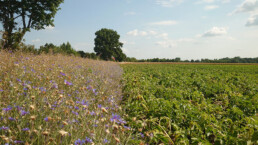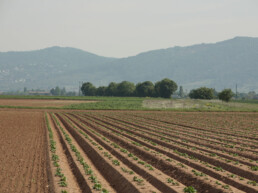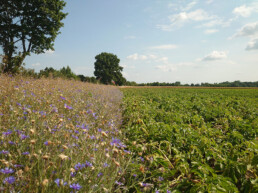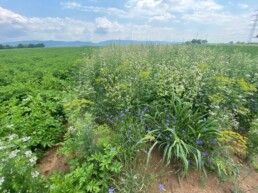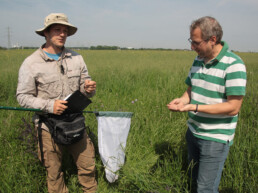Potato cultivation (Kaufland)
Objective
Promoting biodiversity in potato cultivation through the creation of habitats and food sources for beneficial organisms. In addition, investigation into whether beneficial insect strips can reduce the use of pesticides on cultivated land.
Project Overview
The company
Kaufland
Involved organisations
Wild Company, Lake Constance Foundation
Pilot project duration
January 2022 - May 2023
Location
Northern Upper Rhine, Baden-Württemberg
Number of companies
4
Pilot crop area
57 ha
Selected Measures
Creation of the beneficial insect strip
The beneficial insect strips were sown along the potato ridges and thus have direct contact with the potato plants. The photo shows a field 10 days after sowing the beneficial insect strips.
Annual beneficial insect flower strips at regular intervals
The beneficial insect flower strips were planted at regular intervals in the potato fields. This creates habitats for insects in otherwise large fields with few protection options.
Beneficial insect flower strips at the end of June
At the end of June, this beneficial flowering strip provides good protection, habitat and food for various insects.
Monitoring insect diversity
Insect abundance and species composition were recorded by an entomologist on the pilot areas on several occasions and the differences compared to reference areas without beneficial insect flower strips were analysed. Here you can see the preliminary discussion.
Training and Other Activities
Recurring meetings of all participating farm managers to coordinate the implementation of measures, accompanied by a cultivation consultant from Wild.
Monitoring of wild bees, stinging bees and wasps to check the success of the measures
Pilot Project Achievements
It was possible to test measures that question the fundamental principles of modern intensive agriculture. One example of this is the planting of beneficial flower strips on 10 % of the potato fields. This made large cultivated areas more species-rich and created measures to promote biodiversity.
As part of the pilot project, it was possible to pursue a cooperative approach and implement biodiversity measures together with nature conservation, agriculture and the market. All stakeholders were involved, the implementation of measures was discussed together, and cost-covering financing was ensured. This increased both the acceptance of farmers and their interest in biodiversity. In general, the beneficial insect strips contributed to the positive image of agriculture.
As part of the monitoring, several beneficial insects and rare species were detected in the beneficial insect strips. It is also clear that the food supply for pollinating insects has been significantly increased by the measure.
Contact us
Kaufland Stiftung & Co. KG
Press office: presse@kaufland.de
Lake Constance Foundation
Saskia Wolf: saskia.wolf@bodensee-stiftung.org

